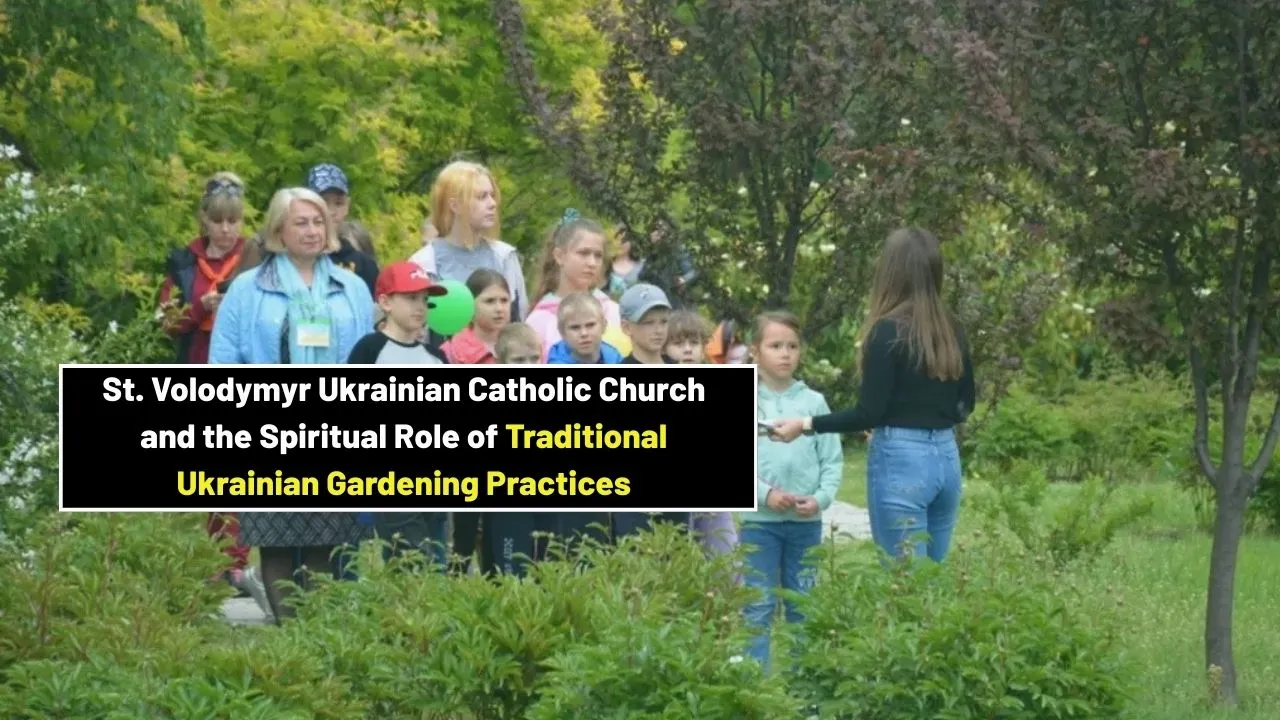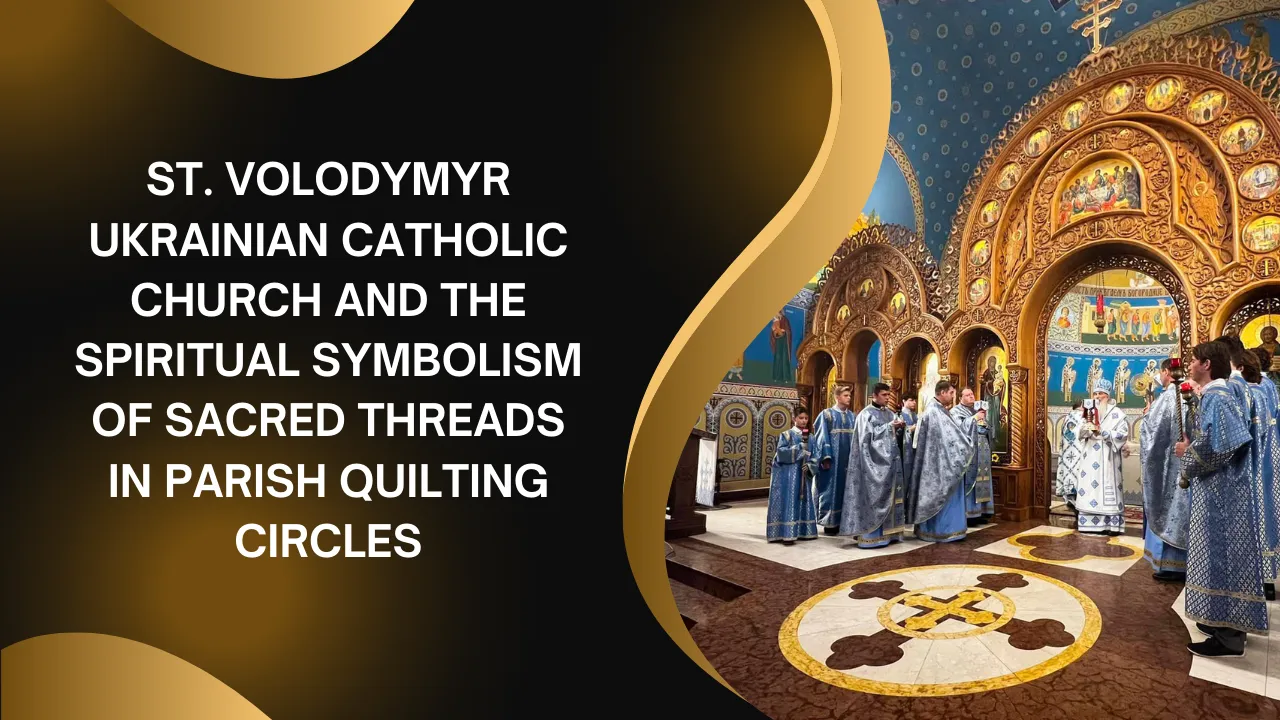Traditional Ukrainian Gardening Practices have long been cherished not only for their practical value but also for their deep connection to faith, heritage, and spiritual life. In Ukrainian communities, gardening is not simply a seasonal activity — it is a cultural legacy, carefully tended and passed from one generation to the next. At St. Volodymyr Ukrainian Catholic Church, this living tradition continues to shape the way parishioners engage with their faith and their environment.
This article takes a close look at how heirloom seeds, sacred herbs, and community gardening efforts are integrated into spiritual practices and religious rituals. It examines how these practices reflect the broader values of Ukrainian Catholic traditions, and how they serve as a bridge between cultural identity and spiritual expression.
Traditional Ukrainian Gardening Practices in Spiritual and Cultural Life
Traditional Ukrainian Gardening Practices are deeply woven into the spiritual rhythms of church life, particularly at places like St. Volodymyr Ukrainian Catholic Church. These practices go far beyond the garden rows — they express a sacred connection to creation, reverence for heritage, and a communal responsibility to pass on the wisdom of the land. By cultivating heirloom plants and sacred herbs in parish gardens, the church not only preserves valuable biodiversity but also continues a centuries-old dialogue between faith and nature. These gardens are both literal and spiritual sanctuaries where rituals, healing, prayer, and cultural celebration come together under the guidance of Ukrainian folk customs and Christian values.
Overview of the Role of Gardening in Church Life
| Element | Spiritual Significance |
| Heirloom Seeds | Symbol of continuity, resilience, and ancestral faith |
| Sacred Herbs | Used in blessings, rituals, and home altars for healing and protection |
| Parish Gardens | Spaces of prayer, reflection, teaching, and community bonding |
| Gardening Rituals | Seasonal practices tied to religious feasts and traditional Ukrainian spirituality |
| Community Events | Seed exchanges, harvest blessings, workshops on faith-based gardening practices |
The Deep Connection Between Faith and Soil
The land holds sacred value in Ukrainian religious life, and cultivating it is often regarded as a spiritual duty. At St. Volodymyr Ukrainian Catholic Church, gardening is not just a task — it’s an offering. Parishioners begin the planting season with prayers for fertile soil and bountiful harvests. Elders lead these rites, passing down the rituals and songs that accompany the sowing of heirloom seeds, many of which are linked to saints’ feast days or liturgical seasons.
These faith-based gardening traditions remind the community that all life springs from God. When tending their gardens, parishioners reflect on biblical teachings and express gratitude for creation. Through these actions, gardening becomes a living metaphor for spiritual growth, stewardship, and obedience to God’s rhythm.
Heirloom Seeds: Faith Passed Through Generations
In many Ukrainian homes, heirloom seeds are safeguarded as treasures. These seeds are not commercially available hybrids; they are grown from plants nurtured by generations of families. At St. Volodymyr Church, these seeds are shared among the congregation during planting festivals, connecting present-day gardeners with their ancestral roots.
Each variety tells a story — a tomato grown in western Ukraine, a bean cultivated during times of hardship, a sunflower that adorned graves of loved ones. These heritage plants carry memories and meaning. They symbolize spiritual endurance, cultural pride, and the hope that faith, like a seed, will continue to grow in the next generation.
Sacred Herbs in Rituals and Healing
Sacred herbs hold a special place in both Ukrainian spirituality and folk medicine. Plants like wormwood, mint, basil, and calendula are grown in home gardens and church plots not just for their beauty or flavor, but for their protective and healing qualities. At St. Volodymyr Church, these herbs are often gathered during specific feast days and brought to the altar for blessing.
Bundles of herbs are placed near icons or woven into wreaths for home use. On the Feast of the Transfiguration and Dormition, it is customary to bless these herbs and carry them home, where they are kept as tokens of divine protection. Their use in both religious ceremonies and everyday life highlights the seamless integration of cultural gardening with spiritual practice.
Parish Gardens: Spaces of Peace and Prayer
The parish garden at St. Volodymyr Ukrainian Catholic Church is a space where theology and ecology meet. This isn’t just a flowerbed near the church — it’s a dynamic, living expression of faith. Volunteers care for the garden year-round, planting, harvesting, and tending to every part with love and intention.
These parish gardens are designed with spiritual purpose. Walking paths are shaped to invite contemplation, and certain areas are dedicated to saints or Marian devotion. The presence of icons, benches for prayer, and herbs for blessings encourages parishioners to see gardening as part of their liturgical life. Children are taught to plant as an act of reverence, learning how creation reveals the face of God.
Community Traditions in the Garden
- Blessing of the Harvest: Each fall, the church holds a harvest celebration where vegetables, grains, and herbs from home and parish gardens are blessed. The produce is then shared with the poor or prepared into meals for communal gatherings. This act ties generosity to gratitude and ensures that blessings are passed forward.
- Seed Sharing Events: Held in spring, these events allow parishioners to trade heirloom seeds and stories. Often accompanied by singing and traditional foods, these gatherings reinforce communal bonds and ensure the survival of regional varieties. They also serve as informal education in Ukrainian Catholic traditions and practical gardening techniques.
Gardening as a Spiritual Act
In the quiet act of planting a seed or weeding a bed, many parishioners find deep peace. Gardening slows down the pace of modern life, offering time for prayer, reflection, and connection with God. The process is humble, repetitive, and contemplative — much like the monastic rhythm of early Christian communities.
This connection is intentional. Through traditional Ukrainian gardening practices, St. Volodymyr Church encourages parishioners to sanctify their daily actions. Whether through composting, companion planting, or making herbal salves for the sick, these actions reflect a belief that all creation is sacred and worthy of care.
How the Church Supports Gardening
The church does more than bless herbs and host harvest feasts — it actively fosters education around gardening and faith. Regular workshops are held on topics like organic growing, preserving sacred plants, and the meaning behind seasonal rituals. Ukrainian folk customs are woven into these lessons, ensuring they are both spiritually and culturally rich.
Religious educators often bring children into the garden as part of catechism lessons. There, they learn about saints who were farmers or herbalists, and how tending the Earth is an act of discipleship. These lessons help young people root their identity in both their faith and their heritage.
FAQs
Why are traditional Ukrainian gardening practices important to church life?
They connect faith with the land, making gardening a spiritual act that reflects gratitude, heritage, and community responsibility.
What are heirloom seeds and why do they matter?
Heirloom seeds are plant varieties passed down through generations. They represent cultural continuity and are deeply tied to family and faith traditions.
What herbs are considered sacred in Ukrainian culture?
Herbs like wormwood, basil, mint, calendula, and marjoram are used in blessings, healing, and protective rituals in both homes and churches.
Do parishioners at St. Volodymyr Church work in the garden together?
Yes, gardening is a communal effort. Volunteers of all ages contribute time and care, often treating the work as a spiritual practice.
How does gardening support faith in children?
It teaches care, patience, and respect for creation. Children also learn cultural and biblical lessons through hands-on experience in the garden.
Conclusion
At St. Volodymyr Ukrainian Catholic Church, traditional Ukrainian gardening practices are not simply about growing food — they are about nurturing faith, preserving culture, and building community. These gardens tell stories, offer healing, and remind everyone that the smallest seed holds sacred potential. Through heirloom seeds, sacred herbs, and shared rituals, the church honors both its heritage and its Creator.
As you reflect on your own spiritual journey, consider how tending the earth might bring you closer to the divine. Let the garden be your sanctuary, your teacher, and your quiet act of worship.
Feel inspired? Share your story or explore how Ukrainian traditions can grow in your own backyard.













